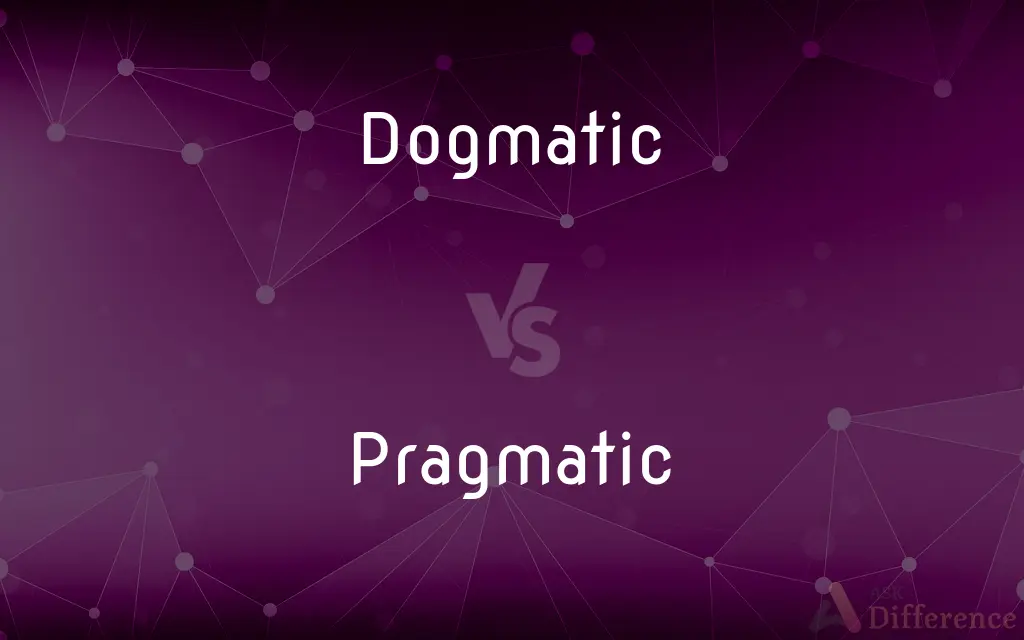Dogmatic vs. Pragmatic — What's the Difference?
By Maham Liaqat & Fiza Rafique — Updated on March 8, 2024
Dogmatic emphasizes rigid adherence to beliefs, while pragmatic focuses on practical approaches and results.

Difference Between Dogmatic and Pragmatic
Table of Contents
ADVERTISEMENT
Key Differences
Dogmatic approaches in thinking or decision-making are characterized by a strong adherence to specific doctrines or ideologies, often without consideration of evidence or practicality. Individuals or systems that are dogmatic are typically inflexible, insisting that there is only one correct way to view or do something. On the other hand, pragmatic approaches prioritize practicality and effectiveness over theoretical or ideological purity. Pragmatism involves adapting one's methods and ideas to achieve the best possible outcome in any given situation, even if it means deviating from established norms or beliefs.
While dogmatism holds onto established beliefs rigidly, often leading to a refusal to consider alternative viewpoints or evidence that contradicts those beliefs, pragmatism is inherently flexible and open. A pragmatic individual values what works and is willing to change opinions or approaches based on new information or the efficacy of different strategies. This adaptability contrasts sharply with the dogmatic adherence to predetermined principles, regardless of their real-world applicability.
The dogmatic mindset often leads to a lack of progress and innovation, as it discourages questioning and the exploration of new ideas. This can be particularly detrimental in fields such as science, politics, and education, where growth and advancement rely on open inquiry and the ability to adjust based on evidence and results. Conversely, a pragmatic approach encourages experimentation, learning from experience, and the continuous refinement of ideas and methods, which are crucial for development and solving complex problems.
Dogmatism can foster an environment of exclusion and intolerance, where only one way of thinking is accepted, and dissenting views are not tolerated. Such an environment stifles creativity and can lead to conflict. In contrast, pragmatism promotes inclusivity and cooperation, as it values diverse perspectives and the collective search for effective solutions. This makes pragmatism particularly valuable in collaborative and interdisciplinary efforts, where multiple viewpoints and skill sets are combined to address challenges.
The distinction between dogmatic and pragmatic also reflects in leadership and organizational cultures. Dogmatic leaders may demand conformity and adherence to specific ideologies, potentially leading to a rigid and unresponsive organization. Pragmatic leaders, however, prioritize results and adaptability, fostering a culture of innovation, flexibility, and responsiveness to change. This approach can better equip organizations to navigate uncertainties and rapidly evolving landscapes.
ADVERTISEMENT
Comparison Chart
Definition
Insisting on principles as incontrovertibly true, without consideration of evidence or practicality.
Focusing on practical approaches and results, rather than theories or ideologies.
Approach
Rigid adherence to specific doctrines or beliefs.
Adaptable, based on what works best in a given situation.
Flexibility
Low; resistant to change and new ideas.
High; open to changing methods or beliefs based on outcomes.
Goal
Maintaining fidelity to a specific set of beliefs or doctrines.
Achieving the best possible outcome, regardless of pre-established beliefs.
Impact
Can lead to stagnation and conflict due to a lack of openness.
Promotes innovation, cooperation, and problem-solving.
Compare with Definitions
Dogmatic
Unwilling to adapt beliefs despite new evidence.
Despite data, her dogmatic stance on health policies remained unchanged.
Pragmatic
Focuses on what is practical and effective.
Her pragmatic approach to problem-solving resulted in efficient solutions.
Dogmatic
Adheres strictly to specific doctrines without questioning.
His dogmatic approach to economics ignores recent research.
Pragmatic
Willingness to change tactics based on results.
He adopted a pragmatic stance in negotiations, adjusting strategies to achieve objectives.
Dogmatic
Can lead to intolerance of differing opinions.
The manager's dogmatic leadership style caused unrest among innovative staff.
Pragmatic
Open to new information and perspectives.
The team's pragmatic attitude fostered innovative ideas.
Dogmatic
Not open to considering alternative viewpoints.
His dogmatic views on education reform hinder progress.
Pragmatic
Promotes experimenting and learning from outcomes.
The company's pragmatic culture drives continuous improvement.
Dogmatic
Prioritizes adherence to ideological purity over practicality.
They follow a dogmatic methodology in their research, overlooking practical applications.
Pragmatic
Values achieving effective outcomes over following specific doctrines.
Their pragmatic policies prioritize tangible results over theoretical ideals.
Dogmatic
Relating to, characteristic of, or resulting from dogma.
Pragmatic
Dealing or concerned with facts or actual occurrences; practical.
Dogmatic
Asserting or insisting upon ideas or principles, especially when unproven or unexamined, in an imperious or arrogant manner
"People in recovery groups can be dogmatic, asserting that the group's way is 'the way' or bashing other approaches" (Anne M. Fletcher).
Pragmatic
(Philosophy) Of or relating to pragmatism.
Dogmatic
Characterized by such assertion, often with an unconsidered rejection of criticism
A dogmatic adherence to a single educational model.
Pragmatic
(Linguistics) Of or relating to pragmatics.
Dogmatic
Adhering only to principles which are true a priori, rather than truths based on evidence or deduction.
Pragmatic
Relating to or being the study of cause and effect in historical or political events with emphasis on the practical lessons to be learned from them.
Dogmatic
Pertaining to dogmas; doctrinal.
Pragmatic
A pragmatic sanction.
Dogmatic
Asserting dogmas or beliefs in a superior or arrogant way; opinionated, dictatorial.
Pragmatic
Practical, concerned with making decisions and actions that are useful in practice, not just theory.
The sturdy furniture in the student lounge was pragmatic, but unattractive.
Dogmatic
One of an ancient sect of physicians who went by general principles; opposed to the empiric.
Pragmatic
Philosophical; dealing with causes, reasons, and effects, rather than with details and circumstances; said of literature.
Dogmatic
One of an ancient sect of physicians who went by general principles; - opposed to the Empiric.
Pragmatic
Interfering in the affairs of others; officious; meddlesome.
Dogmatic
Pertaining to a dogma, or to an established and authorized doctrine or tenet.
Pragmatic
A man of business.
Dogmatic
Asserting a thing positively and authoritatively; positive; magisterial; hence, arrogantly authoritative; overbearing.
Critics write in a positive, dogmatic way.
[They] are as assertive and dogmatical as if they were omniscient.
Pragmatic
A busybody.
Dogmatic
Characterized by arrogant assertion of unproved or unprovable principles
Pragmatic
A public decree.
Dogmatic
Relating to or involving dogma;
Dogmatic writings
Pragmatic
Of or pertaining to business or to affairs; of the nature of business; practical; material; businesslike in habit or manner.
The next day . . . I began to be very pragmatical.
We can not always be contemplative, diligent, or pragmatical, abroad; but have need of some delightful intermissions.
Low, pragmatical, earthly views of the gospel.
Pragmatic
Busy; specifically, busy in an objectionable way; officious; fussy and positive; meddlesome.
The fellow grew so pragmatical that he took upon him the government of my whole family.
Pragmatic
Philosophical; dealing with causes, reasons, and effects, rather than with details and circumstances; - said of literature.
Pragmatic
One skilled in affairs.
My attorney and solicitor too; a fine pragmatic.
Pragmatic
A solemn public ordinance or decree.
A royal pragmatic was accordingly passed.
Pragmatic
Concerned with practical matters;
A matter-of-fact (or pragmatic) approach to the problem
A matter-of-fact account of the trip
Pragmatic
Of or concerning the theory of pragmatism
Pragmatic
Guided by practical experience and observation rather than theory;
A hardheaded appraisal of our position
A hard-nosed labor leader
Completely practical in his approach to business
Not ideology but pragmatic politics
Common Curiosities
Can someone be both dogmatic and pragmatic?
While seemingly contradictory, someone might apply a dogmatic approach in certain beliefs while being pragmatic in day-to-day problem-solving. However, these approaches generally represent opposite ends of a spectrum.
What is pragmatic?
Pragmatic describes an approach that prioritizes practicality and effectiveness, adapting methods to achieve the best outcomes.
Why is pragmatism important?
Pragmatism is important because it encourages flexibility, adaptability, and a focus on results, which are crucial for solving complex problems and advancing in various fields.
What are the drawbacks of being dogmatic?
Dogmatism can lead to closed-mindedness, resistance to change, and conflict with others who hold different views, hindering personal and collective growth.
How does a pragmatic approach influence decision-making?
A pragmatic approach influences decision-making by valuing practical outcomes and the adaptability of strategies based on real-world feedback, leading to more effective solutions.
Can dogmatism ever be beneficial?
While generally viewed negatively, dogmatism can provide a sense of certainty and direction in situations where firm beliefs are needed. However, this is typically at the expense of flexibility and openness.
What does dogmatic mean?
Dogmatic refers to an unyielding adherence to certain principles or beliefs, regardless of contrary evidence or practicality.
In what contexts is pragmatism particularly valuable?
Pragmatism is especially valuable in rapidly changing environments, interdisciplinary projects, and where innovation and adaptability are key to success.
How do dogmatic and pragmatic approaches affect teamwork?
Dogmatic approaches might stifle teamwork by limiting openness to diverse ideas, whereas pragmatic approaches encourage collaboration and innovation by valuing diverse perspectives and solutions.
How can one develop a more pragmatic approach?
Developing a more pragmatic approach involves cultivating open-mindedness, willingness to experiment, focus on practical outcomes, and adaptability to change based on evidence and feedback.
Share Your Discovery

Previous Comparison
Sail vs. Voyage
Next Comparison
Oxblood vs. CordovanAuthor Spotlight
Written by
Maham LiaqatCo-written by
Fiza RafiqueFiza Rafique is a skilled content writer at AskDifference.com, where she meticulously refines and enhances written pieces. Drawing from her vast editorial expertise, Fiza ensures clarity, accuracy, and precision in every article. Passionate about language, she continually seeks to elevate the quality of content for readers worldwide.














































